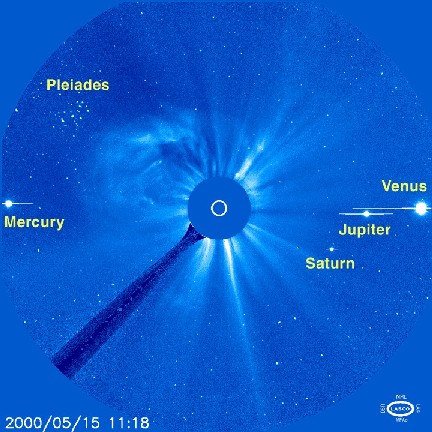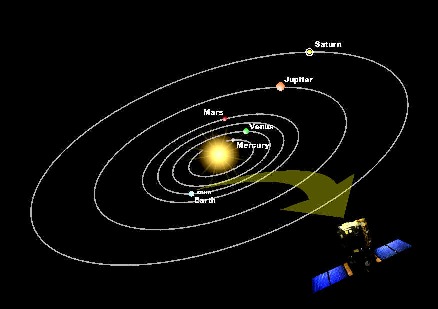Four planets and the Pleiades!
| Click on the image for a larger version |
 |
|
LASCO C3 image showing Jupiter, Saturn, Mercury and Venus simultaneously.
The white circle in the middle of the image indicates the size of the Sun,
blocked out by an occulting disk to show the surrounding corona. The
horizontal lines are not planetary rings, but "pixel
bleeding" resulting from over-exposure. The dark feature pointing towards
the lower left corner is the shadow of the pylon holding the occulter.
Also available: 1200x1200 pixel TIFF image, and a composite of
LASCO C2 and C3 with an EIT image of the Sun in the middle (720x407
JPEG and 2100x1188 TIFF). |
Caption: Mercury, Venus, Jupiter, Saturn and the Sun all appear plainly in the same image sent to Earth on 15 May by the SOHO spacecraft. Also conspicuous in the picture is a famous star cluster, the Pleiades. This image of four planets around the Sun is another scoop for SOHO. Bright Venus entered the scene from the right on 13 May, while Mercury was on its way out on the left.
Such congregations of planets are rare events, and they cannot be seen from the ground when close in the sky to the dazzling Sun. But the LASCO C3 instrument on SOHO uses a mask to blot out direct sunlight, and it has a wide enough field of view (15 degrees) to take in the four planets in the same picture.
The diagram below shows orbital positions of the planets and SOHO in relation to the Sun, at the time of the picture. The diagram is not to scale. SOHO is stationed 1.5 million kilometres from the Earth, on the sunward side, and the Sun is about 150 million km away. The nearest planet in SOHO's image is Mercury, less than 60 million km beyond the Sun, while Saturn's distance beyond the Sun is more than 1400 million km.

Click on the image for an enlarged view
Also available: 3500x2400 version
All of the planets move across the LASCO instrument's field of view from day to day, as they follow their individual orbits anti-clockwise around the Sun. But while Mercury and Venus progress in the natural direction (right to left) Jupiter and Saturn appear to shift backwards (left to right) because of the faster orbital speed of the Earth and SOHO.
Built in Europe for a project of international cooperation between the European Space Agency and NASA, SOHO is equipped with instruments from European and American scientists. The LASCO coronagraph is made and operated by a transatlantic team led by the US Naval Research Laboratory.
Movies: The following movies cover the time frame from 28 April - 19 May. Due to the very large number of frames captured in this interval (921), we offer movies that skip every 2nd frame as well as movies with all frames included.
Movies skipping every 2nd frame:
320x240,
640x480.
Movies including every frame:
320x240,
640x480.
TV media: The corresponding list of 640x480 pixel GIFs, provided by Nathan Rich (NRL), can be found in this zipfile
Related links:
- ESA press release (4 May 2000)
- ESA press release (15 May 2000)
- NASA press release (5 may 2000)
- A Christmas Star for SOHO (NASA Science News article, 16 May 2000)
- ESA press release (15 May 2000)
Picture Credit: SOHO/LASCO (ESA & NASA)
Image processing/annotation: Steele Hill
Instrument/observatories: LASCO (Large Angle and Spectrometric Coronagraph)
Taken: 15 May 2000, 11:18UT


